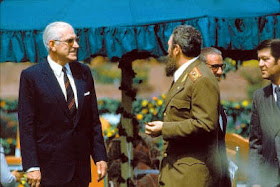“The generalized and systematic use of excessive
force during demonstrations and the arbitrary detention of protestors and
perceived political opponents indicate that these were not the illegal
or rogue acts of isolated officials...” - UN Human Rights Office
Venezuela: Human rights
violations indicate ‘policy to repress’ - UN report
GENEVA (30 August 2017) – Extensive human rights violations and abuses have been committed in the context of anti-Government protests in Venezuela and point to “the existence of a policy to repress political dissent and instill fear in the population to curb demonstrations,” a report* by the UN Human Rights Office has found.
“The generalized and systematic use of excessive force during demonstrations and the arbitrary detention of protestors and perceived political opponents indicate that these were not the illegal or rogue acts of isolated officials,” the report says.
The report calls on the UN Human Rights Council to consider taking measures to prevent the human rights situation in Venezuela, currently a Council member, from worsening.
Analysis by the UN Human Rights Office indicates that of the 124 deaths linked to the protests being investigated by the Attorney General’s Office as of 31 July, the security forces were reportedly responsible for 46 and pro-Government armed groups, known as armed colectivos, for 27.
Responsibility for the remaining 51 deaths has not yet been determined.
During the period covered by the report, 1 April to 31 July, the Attorney-General’s Office opened investigations into at least 1,958 cases of reported injuries in the context of demonstrations. The report’s analysis of injuries shows the use of force progressively escalated. In the first half of April, the majority of injuries were from inhaling tear gas; by July, medical personnel were treating gunshot injuries.
“The policies pursued by the authorities in their response to the protests have been at the cost of Venezuelans’ rights and freedoms,” said UN High Commissioner for Human Rights Zeid Ra’ad Al Hussein.
“The Government must ensure there are prompt, independent and effective investigations of the human rights violations allegedly committed by the security forces and of the abuses involving armed colectivos or violent protesters. This includes ensuring that the investigations initiated by the Attorney General during the period covered by this report continue and are scrupulously and visibly impartial,” he stressed.
“The right to peaceful assembly was systematically violated, with protestors and people identified as political opponents detained in great numbers. The report also identifies serious violations of due process and patterns of ill-treatment, in some cases amounting to torture,” Zeid said.
According to reliable estimates from a local NGO, more than 5,000 people were detained since 1 April, with more than 1,000 reportedly still held as of 31 July. At least 609 civilians arrested in the context of protests were presented before military tribunals. The report calls on the Government to halt arbitrary detention and the use of military courts to try civilians.
Loosely organized groups of anti-Government protestors resorted to violent means, using improvised weapons ranging from rocks and slingshots to Molotov cocktails and homemade mortars, the report says. At least four people were allegedly killed by anti-Government groups or individuals and, according to the Government, nine members of the security forces had been killed as of 31 July. The report calls on the opposition parties to condemn all acts of violence, in particular when these originated from groups of violent protesters.
The report documents attacks against journalists and media workers by security forces that were apparently aimed at preventing them from covering demonstrations. “Demonstrators and journalists were labelled by high-level authorities as ‘enemies’ and ‘terrorists’ – words that did little to counter, and may even have contributed to, the climate of violence and polarization,” the High Commissioner said.
While acknowledging that the number of demonstrations, detentions and deaths have decreased since 1 August, Zeid expressed concern about recent measures taken by authorities to criminalize leaders of the political opposition through the Commission of Truth, Justice and Peace.
“The Commission, recently established by the Constituent Assembly, does not meet the basic requirements of transparency and impartiality, to conduct investigations that are independent and free from political motivation on human rights violations and abuses,” he said.
The High Commissioner warned that amid continuing economic and social crises and rising political tensions, there is a grave risk the situation in Venezuela will deteriorate further.
“I encourage the Venezuelan Government to follow up on the recommendations made in the report and to use its findings as guidelines to seek truth and justice for the victims of human rights violations and abuses. I once again call on the Government to renounce any measure that could increase political tension in the country and appeal to all parties to pursue meaningful dialogue to bring an end to this crisis,” Zeid said.
*As the Venezuelan Government did not respond to requests for access, a team of human rights investigators conducted remote monitoring from 6 June to 31 July. The report is based on their analysis of the information they gathered, including through some 135 interviews with victims and their families, witnesses, civil society organizations, journalists, lawyers, doctors, first responders and the Attorney General’s Office.Watch @UNHumanRights chief #Zeid brief the Press @UNGeneva this morning on human rights violations in #Venezuela 🎥https://t.co/cFIMJcx6nh pic.twitter.com/SmD2rwGDwg— UN Geneva (@UNGeneva) August 30, 2017
Read the full report here: http://www.ohchr.org/Documents
Video interview with Hernán Vales, UN Human Rights Officer, about the report. Link available for download for 7 days: https://we.tl/GpcWWlSXpP
For more information and media requests, please contact:
Rupert Colville - + 41 22 917 9767 / rcolville@ohchr.org
Liz Throssell - + 41 22 917 9466 / ethrossell@ohchr.org
Ravina Shamdasani + 41 22 917 9169 / rshamdasani@ohchr.org
Concerned about the world we live in? Then STAND UP for someone’s rights today. #Standup4humanrights and visit the web page at http://www.standup4humanrig
Tag and share - Twitter: @UNHumanRights and Facebook: unitednationshumanri

























